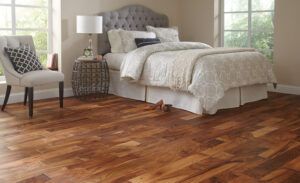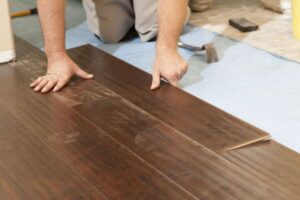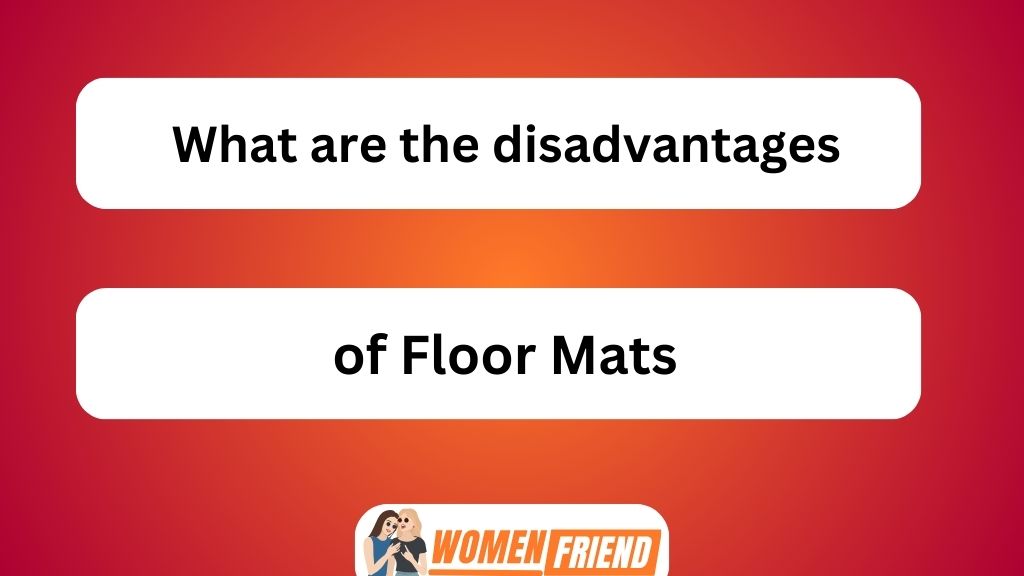At first, we might think that choosing the right flooring for our homes is a simple task. However, with so many options available, it can quickly become overwhelming. But fear not! We are here to guide you through the maze of hardwood,  , vinyl, tile, carpet, cork, bamboo, and linoleum flooring.
, vinyl, tile, carpet, cork, bamboo, and linoleum flooring.
In this article, we will explore the pros and cons of each type and help you find the perfect match for your lifestyle and budget.
So let’s dive in and uncover the secrets of selecting the ideal flooring for your home!
Key Takeaways of What Are the Different Types of Flooring and Which Is Right for Me
- Hardwood flooring is a timeless and elegant choice, but it is expensive compared to other options and not suitable for high moisture areas.
- Laminate flooring is a highly durable and affordable option that mimics the look of hardwood or tile, but it cannot be refinished if damaged.
- Vinyl flooring has a lifespan of 10 to 20 years, withstands heavy foot traffic, and requires minimal maintenance. It is also resilient and resistant to scratches, stains, and moisture.
- Tile flooring is durable, low-maintenance, and offers a wide range of design options. Porcelain tiles are known for their strength and versatility, while ceramic tiles are more affordable. Natural stone tiles, such as marble or travertine, provide a luxurious look.
Pros and Cons of Hardwood Flooring
When considering flooring options, it’s important to weigh the pros and cons of hardwood flooring.
Hardwood flooring is a timeless and elegant choice that can enhance the aesthetics of any space. One major advantage of hardwood flooring is its durability and longevity. With proper installation and maintenance, hardwood floors can last for decades. Additionally, hardwood floors are easy to clean and maintain, requiring only regular sweeping or vacuuming and occasional refinishing.

However, it’s worth noting that hardwood flooring installation can be more expensive compared to other options, and it may not be suitable for areas with high moisture levels like bathrooms or basements. Despite this, the natural beauty, warmth, and versatility of hardwood make it a popular choice for many homeowners.
As we explore the beauty of laminate flooring…
Exploring the Beauty of Laminate Flooring
Laminate flooring offers numerous benefits that make it an attractive choice for homeowners.
Not only is it highly durable and easy to maintain, but it also comes in a wide range of stylish designs that can mimic the look of hardwood, tile, or stone flooring.
Additionally, laminate flooring is an affordable option compared to other types of flooring, making it a practical choice for those on a budget.
Benefits of Laminate Flooring
If you’re looking for an affordable and durable flooring option, you’ll love how laminate flooring can mimic the look of hardwood or tile. Laminate flooring offers numerous benefits that make it a popular choice for homeowners.
One of its major advantages is its cost-effectiveness compared to real hardwood or tile floors. It is also highly durable and resistant to scratches, stains, and fading caused by sunlight. Additionally, laminate flooring is easy to install due to its tongue-and-groove locking system, making it a great option for DIY enthusiasts. The wide range of styles and designs available allows you to find the perfect match for your home decor.

However, it’s important to consider some cons as well. While laminate flooring is water-resistant, excessive moisture can cause damage over time. Additionally, unlike real hardwood floors, laminate cannot be refinished if it gets worn out or damaged.
Overall, the characteristics and features of laminate flooring make it a versatile and practical choice for those seeking an attractive yet affordable solution for their floors.
Durability and Maintenance
To maintain the durability of your laminate flooring, remember to regularly clean it with a damp mop and avoid using abrasive cleaning products. Laminate flooring is known for its durability and low maintenance requirements. Here are three key tips to help you keep your laminate floors looking their best:
- Wipe up spills immediately: Laminate flooring is resistant to stains, but it’s still important to clean up any spills promptly to prevent moisture from seeping into the seams.
- Use furniture pads: To protect your laminate floor from scratches caused by moving furniture, place felt or rubber pads under the legs of chairs, tables, and other heavy pieces.
- Avoid excessive water: While laminate flooring is generally water-resistant, excessive moisture can cause damage over time. Avoid using excessive amounts of water when cleaning and be sure to dry the floor thoroughly afterwards.
By following these simple maintenance practices, you can ensure that your laminate flooring remains durable and beautiful for years to come.
Now let’s move on to discussing another stylish and affordable choice in flooring options…
Stylish and Affordable Choice
When considering flooring options, you’ll find that laminate is a stylish and affordable choice. Laminate flooring has come a long way in terms of aesthetics and design, making it a popular option for homeowners who want to achieve the look of hardwood or stone without breaking the bank. It is available in a wide range of styles, colors, and textures that can complement any interior design theme.
Here is a comparison table showcasing the features of laminate flooring:
| Feature | Description | Benefits |
|---|---|---|
| Durability | Laminate flooring is highly durable and resistant to scratches, stains, and fading. | Long-lasting investment |
| Maintenance | Easy to clean with regular sweeping and occasional mopping. Requires minimal maintenance compared to other flooring types. | Time-saving solution |
| Affordability | Laminate flooring offers an affordable alternative to expensive materials like hardwood or stone. Installation costs are also lower. | Cost-effective solution |
With its stylish designs, durability, low maintenance requirements, and affordability, laminate flooring proves to be an excellent choice for those seeking both style and cost-effectiveness in their home renovations or new construction projects.
The Durability of Vinyl Flooring
When it comes to vinyl flooring, one of the key factors to consider is its lifespan. Vinyl floors are known for their durability and can last anywhere from 10 to 20 years with proper care and maintenance.
However, it’s important to compare vinyl with other flooring materials to determine which option is best suited for your specific needs and preferences.
Vinyl Flooring Lifespan
If you’re looking for a durable flooring option, vinyl is a great choice with its long lifespan. Vinyl flooring is known for its ability to withstand heavy foot traffic and everyday wear and tear. Here are three reasons why vinyl flooring has such a long lifespan:
- Easy Installation: Vinyl flooring installation is relatively simple and can be done by DIY enthusiasts or professionals alike. With options like peel-and-stick or click-lock installation, vinyl floors can be easily installed without the need for adhesives or special tools.
- Low Maintenance: Vinyl flooring requires minimal maintenance to keep it looking its best. Regular sweeping or vacuuming, along with occasional damp mopping, is usually enough to keep vinyl floors clean and free from dirt and debris.
- Durable Construction: Vinyl flooring is designed to be resilient and resistant to scratches, stains, and moisture damage. Many vinyl products also come with protective coatings that enhance their durability and make them more resistant to fading or discoloration over time.
With proper installation and regular maintenance, vinyl flooring can last for many years while still maintaining its beauty and functionality.
Vinyl Vs Other Materials?
To compare vinyl with other materials, you should consider factors like durability, maintenance requirements, and overall cost.
When it comes to comparing vinyl with tile flooring, there are a few key differences to keep in mind. Vinyl is known for its durability and resilience, making it a popular choice for high-traffic areas. It is also relatively easy to maintain, requiring only regular sweeping and occasional mopping. In terms of cost, vinyl tends to be more affordable than tile.

On the other hand, when comparing vinyl with carpet flooring, there are some important distinctions as well. While carpet may provide a softer and more comfortable feel underfoot, it is not as durable or resistant to stains and moisture as vinyl. Additionally, carpet requires regular vacuuming and deep cleaning to maintain its appearance.
Ultimately, the decision between vinyl, tile, or carpet will depend on your specific needs and preferences.
Uncovering the Benefits of Tile Flooring
Tile flooring offers a durable and low-maintenance option for homeowners. Here are three advantages of tile flooring and some of the best tile flooring options to consider:
- Durability: Tile is known for its long-lasting durability, making it perfect for high-traffic areas like kitchens and bathrooms. It can withstand heavy foot traffic, scratches, and spills without losing its beauty.
- Low Maintenance: Unlike carpet or hardwood floors, tiles are easy to clean and maintain. They are resistant to stains and water damage, making them ideal for households with pets or young children.
- Design Options: With a wide range of colors, patterns, and sizes available, you can easily find a tile that matches your style preferences. From classic ceramic tiles to trendy porcelain or natural stone tiles, there is something for every aesthetic.
Consider these top tile flooring options: porcelain tiles for their strength and versatility; ceramic tiles for their affordability; natural stone tiles like marble or travertine for a luxurious look.
The Versatility of Carpet Flooring
Carpet flooring offers a cozy and versatile option for homeowners looking to add warmth and comfort to their space. The versatility of carpet is unmatched, as it comes in various colors, patterns, and textures to suit any design aesthetic.
Not only does carpet provide insulation and reduce noise levels, but it also adds a layer of cushioning underfoot. Unlike hardwood flooring, carpet is softer and more forgiving on joints and feet, making it an excellent choice for families with young children or pets.

Additionally, carpet helps to trap dust and allergens, improving indoor air quality. While hardwood floors may be easier to clean, the warmth and comfort that carpet provides cannot be matched.
Ultimately, the decision between carpet and hardwood comes down to personal preference and lifestyle needs.
Understanding the Charm of Cork Flooring
Cork flooring offers a unique and eco-friendly option for homeowners seeking a sustainable and stylish flooring solution. Here are three advantages of cork flooring:
- Durability: Cork is known for its resilience and ability to withstand heavy foot traffic and furniture. It naturally possesses properties that make it resistant to dents, scratches, and moisture damage.
- Comfort: Walking on a cork floor feels soft underfoot due to its natural cushioning properties. It provides excellent insulation against temperature changes, making it warm in winter and cool in summer.
- Sustainability: Cork is harvested from the bark of cork oak trees without harming or killing them. This renewable process allows the trees to regenerate their bark every 9-12 years, making cork flooring an environmentally friendly choice.
When installing cork flooring, keep these tips in mind:
- Ensure the subfloor is clean, dry, and level before installation.
- Acclimate the cork planks to the room’s temperature for at least 48 hours.
- Use adhesive specifically designed for cork flooring to ensure proper bonding.
Eco-Friendly Options: Bamboo and Linoleum Flooring
Now, let’s shift our focus to two eco-friendly flooring options: bamboo and linoleum. Both of these materials offer numerous benefits for those seeking sustainable and durable flooring solutions.
Firstly, bamboo flooring has gained popularity due to its environmentally friendly nature. Bamboo is a fast-growing grass that can be harvested in just a few years, making it highly renewable. It also boasts excellent durability and strength, ensuring longevity in high-traffic areas. Additionally, bamboo is resistant to moisture and stains, making it suitable for kitchens and bathrooms.
On the other hand, linoleum flooring has its own set of advantages. Made from natural materials like linseed oil, cork powder, and wood flour, linoleum is biodegradable and recyclable. It offers excellent resilience against wear and tear while being naturally antimicrobial. Linoleum is also available in a wide range of colors and patterns to suit various design preferences.
Frequently Asked Questions
How Do I Choose the Right Flooring for a High-Traffic Area Like a Hallway or Kitchen?
When choosing flooring for high-traffic areas like hallways or kitchens, we consider durability and aesthetics. It’s important to select a material that can withstand heavy use while still maintaining a stylish appearance.
Can I Install Hardwood Flooring in a Basement or Other Areas Prone to Moisture?
Yes, you can install hardwood flooring in a basement or other moisture-prone areas. However, it’s important to choose moisture-proof options like engineered hardwood or vinyl plank flooring to prevent damage and warping.
What Are the Maintenance Requirements for Laminate Flooring?
Maintaining laminate flooring is essential to prolong its lifespan. Regular cleaning with a damp mop and mild detergent is recommended. Avoid excessive moisture and use protective pads under furniture to prevent scratching.
Are There Any Potential Health Concerns Associated With Vinyl Flooring?
There are indeed potential health concerns associated with vinyl flooring, such as off-gassing of harmful chemicals. However, there are alternative flooring options available that prioritize safety and minimize these risks, such as hardwood or ceramic tile.
Can Carpet Flooring Be Installed in Rooms With Pets or Children?
Carpet flooring is a great option for rooms with pets or children due to its durability and stain resistance. It provides a comfortable and soft surface, making it ideal for play areas or bedrooms.
Conclusion
So there you have it, a comprehensive guide to the different types of flooring.
From the timeless elegance of hardwood to the low-maintenance convenience of laminate, each option comes with its own set of pros and cons.
Vinyl flooring offers durability, while tile provides both beauty and practicality.
Carpet adds warmth and versatility to any space, while cork brings a unique charm.
And for those who prioritize eco-friendliness, bamboo and linoleum are excellent choices.
Now that you know all your options, the question remains: which type of flooring is right for you?
Stay tuned as we reveal the answer in our next article!



